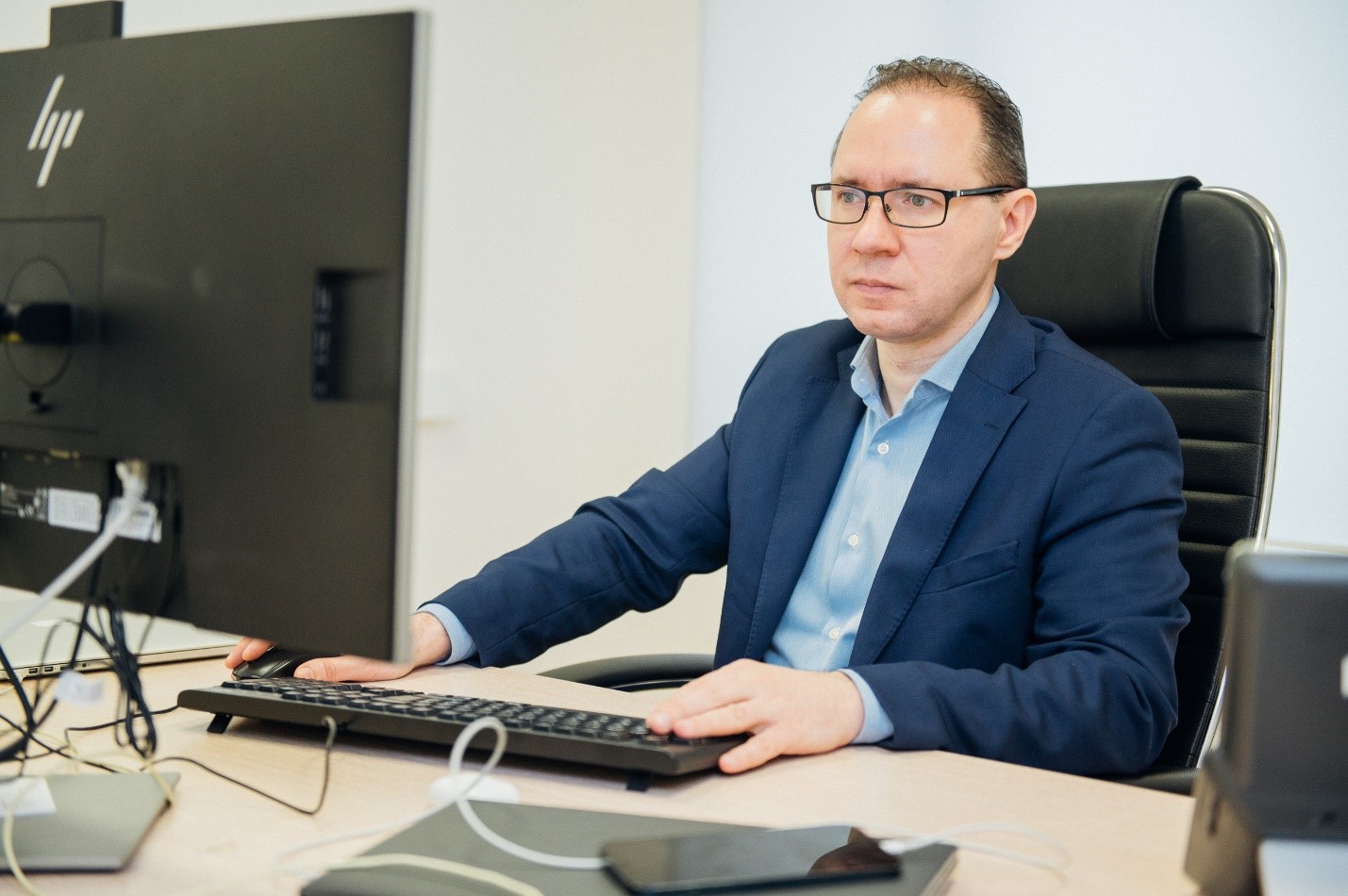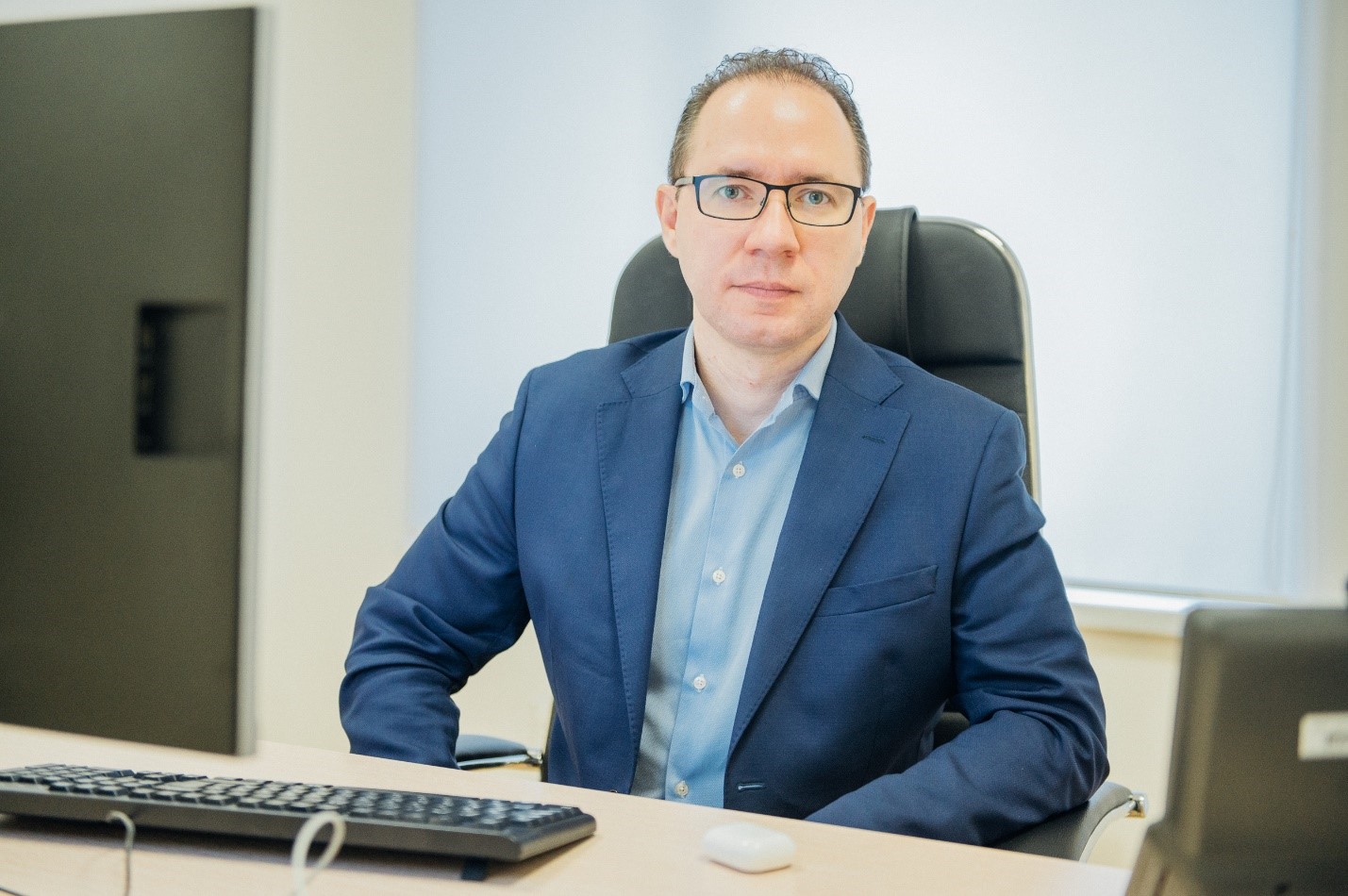'We’re Moving On to the Next Stage of Digital Transformation'
%20(1).jpg)
Dmitry Bondar has served as Senior Director for Digital Transformation at HSE University since January 2021. Since then, the university has introduced and developed numerous new, state-of-the-art information systems. Dmitry Bondar is responsible for ensuring high rates of digital transformation and the good performance of HSE's IT Office. In his interview, he speaks about the integration of new information systems, project management at the IT Office, import substitution in IT, engaging with students, and plans for the current year.
— HSE is a university committed to continually improving its digital environment. What new information systems have been launched in the past year?
— Currently, the university is working to automate its primary business processes in a comprehensive manner. In 2022, several teams collaborated to implement a number of systems, including those for managing admissions, engaging with partners, applicants and contractors, developing academic programmes, and handling procurement and financial accounting.
Our plans for this year include the implementation of several new foundational systems, such as HSE.Reg for managing student records, the Marketplace for educational products, MVP for continuing professional education, microdegree and online courses, the Joint Economic and Social Archive platform for consolidating research across various fields of science, and SmartPro, a system for automating students’ practical training. In fact, we are nearing completion of the comprehensive automation stage. This will stabilise the university's IT landscape, enabling us to advance to the next stage of digital transformation.
— What challenges do you anticipate the IT Office will encounter along the way?
— The previous stage was the most challenging one for the university. During that period, the new interfaces did not necessarily provide benefits for regular users; on the contrary, they could instead add complexity to their work. However, advancing to the next stage would have been impossible without the development and implementation of foundational information systems. The work ahead will be equally labour-intensive, but this time, the changes will have a more substantial impact on both the university's overall performance and individual users.

'We need to be pioneers in the implementation and application of domestically produced digital solutions'
— Import substitution in IT is a major priority for Russian universities today. What processes have been initiated at HSE in this regard and which ones do you anticipate will start shortly?
— Currently, the university is confronted with the unavailability of services and software from foreign manufacturers, coupled with an increase in legislative measures that require the use of domestic IT solutions. Often, we need to be pioneers in the implementation and application of domestically produced digital solutions in the educational process.
In January 2023, the IT Office uploaded a section to the HSE University's website with a list of digital services to be replaced by domestically developed solutions and the current status of their substitution
'Future human resources for the Digital Economy'
— The IT Office is a major employer. Can you tell us about your projects that aim to involve HSE students?
— Students are the most valuable resource of any university. We are particularly committed to engaging proactively with the student community.
For example, last summer, we launched the first enrolment in the IT Staff Development Programme. This internship programme offers students interested in pursuing digital professions an opportunity to start their careers in the IT industry. Students gain an insight into what it takes to practice their chosen IT profession, while also acquiring new competencies, knowledge, and skills in the field.
Based on the results of the pilot enrolment, two students were invited to join the IT Office team. We are currently conducting a second enrolment and looking forward to welcoming more talented students to the IT Office.

Another important project is the HSE University Digital Assistants. The project was initially launched to assist individuals who faced challenges in using digital technology during the pandemic.
Today, the Digital Assistants not only provide assistance and advice in Russian and English through the student-operated Hotline, but they also offer support during online events, work with digital product teams, and even provide digital support outside of the university
They collaborate with charitable foundations through digital volunteering, conduct masterclasses on digital literacy and culture, and provide support for major external online events. Moreover, digital volunteering opens up career opportunities: five students from various courses and programmes have joined the IT Office.
After gaining experience working with our team, many Digital Assistants have been hired by large IT companies. We are pleased to see our students as valuable human resources for the digital economy. We are committed to sharing our positive experience with other Russian universities through our university partnership programme. This will enable our colleagues to launch similar projects at their own institutions.
Our plans for the near future include the launch of a socially significant project called 'Supporting Digital Access to Education for People with Disabilities', which also involves the Student Council's Digitalisation Committee, Digital Assistants, and HSE students with disabilities. We still have a lot of work ahead of us to achieve our overall goals and to develop new ideas and plans for further advancing the university's digital environment.
See also:
‘The Development of Creative Industries Has Become a Priority for Both Russia and Uzbekistan’
The Tourism Development Institute under the Committee for Tourism of the Republic of Uzbekistan and HSE University have signed a cooperation agreement aimed at establishing and developing academic, cultural, and other partnerships in the fields of education and tourism. The initiative for signing the agreement came from the Institute for Creative Industries Development at the HSE Faculty of Creative Industries.
MIEM Begins Open Testing of Claw Engine 2.0
The team at MIEM’s Game Engineering and Interactive Systems studio has begun open testing of the second version of its game engine, Claw Engine. The HSE News Service takes a closer look at the product, which is being developed by MIEM’s student project teams.
‘We Demonstrated That HSE University Can Not Only Build a Satellite, but Maintain Its Operation’
The first HSE University satellite has completed its work in orbit after more than 35,000 hours of trouble-free operation, one billion kilometres travelled (24,600 orbits around the Earth), and hundreds of full-frame shots taken of the Earth's surface across an area of 320,000 km2. The HSE News Service shares the results of the satellite’s mission and the team’s plans for the near future.
Recruitment Campaign 2025: How HSE Attracts Top International Talent
For nearly two decades, HSE University’s international recruitment programmes have brought highly qualified professionals from the global academic job market to Russia—from recent PhD graduates of leading universities to experienced international scholars. On September 1, 2025, the university expects 50 new international faculty and researchers to join its academic team.
Urban Studies Experts from HSE Discuss Cooperation Prospects with Chinese Partners
The team of the HSE Faculty of Urban and Regional Development (FURD) has held a series of meetings with partners in China as part of its working visit focused on advancing cooperation. The agenda included urban and agglomeration ranking research, the development of unique educational programmes in urban studies, and other key topics.
HSE University and Sultan Qaboos University Discuss Cooperation in Science and Education
On May 29, 2025, a delegation from Sultan Qaboos University paid an official visit to HSE University. The meeting was held at the HSE building on Pokrovsky Bulvar and was dedicated to the development of partnership in science and education. The delegation was led by His Highness Dr Fahad Al Said, Vice Chancellor of Sultan Qaboos University. During the visit, the parties signed an agreement on cooperation and academic exchange between the universities.
First Digital Adult Reading Test Available on RuStore
HSE University's Centre for Language and Brain has developed the first standardised tool for assessing Russian reading skills in adults—the LexiMetr-A test. The test is now available digitally on the RuStore platform. This application allows for a quick and effective diagnosis of reading disorders, including dyslexia, in people aged 18 and older.
HSE Scientists Explain How to Identify Brain Areas Critical for Language Function During Surgery
The HSE Centre for Language and Brain conducted a course on tractography, a method that enables visualisation of key brain connections and helps surgeons avoid damaging language-critical areas during surgery. The course was attended by neurosurgeons and radiologists from Moscow and other Russian regions who are interested in methods of preoperative language mapping.
Forbes University Ranking: HSE Has Top Reputation among Employers
On May 22, Forbes Education released its updated ranking of the 100 best universities in Russia for 2025. HSE University retained its second-place position, having established itself as the university with the highest employer reputation. Among the top 20 were 12 universities from Moscow, three from St Petersburg, two from Tatarstan, and one each from the Sverdlovsk, Novosibirsk, and Tomsk regions.
HSE and Sichuan University Sign Cooperation Agreement
On May 20, 2025, HSE University hosted an official delegation from Sichuan University headed by President Wang Jinsong. During the meeting, the universities signed a cooperation agreement.


